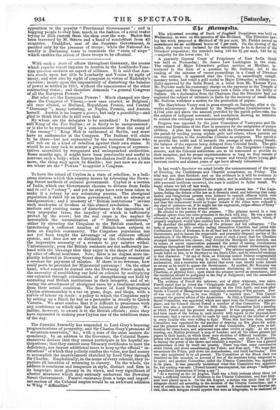To have the island of Ceylon in a state of
rebellion, is a ludi- crous distress which this country incurs by tolerating the Down- ing Street methods of colonial government. Ceylon is a section of India, which our Government chooses to divorce from India and to call a " colony "; and yet no steps have ever been taken to make it a colony by any colonizing process. The aboriginal population is ruled by an alien government, with no attempt at amalgamation ; and a mockery of "British institutions" invites such mockeries of freedom as this absurd revolution. The im- mediate and exciting cause of disturbance is the imposition of -very unpopular taxes, the impolicy of which is sufficiently proved by the event; but the real cause is the neglect to accomplish the naturalization of " British institutions," either by elevating the Cingalese to the British standard, or introducing a sufficient number of British-born subjects to „form an English community. The Cingalese population has not yet been taught the advantage of our elaborate official system, and does not see so distinctly as the Columbo officials the imperative necessity of a revenue to pay salaries withal. Unfortunately, even the British residents are not sufficiently im- bued with the blessings that they enjoy in the shape of taxation .by edict of official nominees. Now, there is no dogma more im- plicitly believed in Downing Street than the primary necessity of a revenue for payment of salaries. If there is no revenue, how could posts be provided for Ministerial patronage? On the other hand, what cannot be dinned into the Downing Street mind, is the necessity of establishing our hold on colonies by multiplying our colonists through colonization, of strengthening our hold by extending real British institutions in their integrity, and of se- curing the attachment of aboriginal races by a treatment studied from their actual condition. The flower of Lord Torrington's Ceylon statesmanship is a tax on guns, dogs, and Shops, with a corvee of labour on roads : a policy to which the Cingalese reply by setting up a Black fat boy as a pretender in rivalry to Queen Victoria. We must confess that it is difficult to pronounce with any confidence on which side lies the balance of absurdity. We incline, however, to award it to the British officials ; since they have succeeded in making poor Ceylon one of the rebellious states of the day.


























 Previous page
Previous page